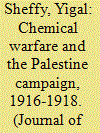| Srl | Item |
| 1 |
ID:
090329


|
|
|
|
|
| Publication |
2009.
|
| Summary/Abstract |
In August 1759 France needed to unite its Mediterranean and Atlantic fleets before invading England. A small British squadron at Gibraltar under Vice-Admiral Edward Boscawen was tasked with blockading the French at Toulon. When the French ran through the Straits of Gibraltar, Boscawen's fleet rapidly got to sea and chased. Confusion among Boscawen's captains and the French unwillingness to stand and fight ensured that the Battle of Lagos was not decisive, but three French ships were taken, two were driven ashore and burned, and the battle became an important precursor to the more famous Battle of Quiberon Bay of November 1759.
|
|
|
|
|
|
|
|
|
|
|
|
|
|
|
|
| 2 |
ID:
090364


|
|
|
|
|
| Publication |
2009.
|
| Summary/Abstract |
World War I historiography focuses on the introduction of chemical weapons to European battlefields, mainly the Western Front, but ignores their use during the Palestine Campaign. In 1917 the (British) Egyptian Expeditionary Force fired chemical-filled artillery shells against Ottoman forces. During the Second Battle of Gaza (April 1917), the chemical bombardment was unsuccessful in supporting the infantry assault. In the Third Battle of Gaza (October-November 1917), it was much more effective in its diversionary role of drawing Ottoman attention away from the main thrust toward Beersheba. This article examines the chemical operations and the Ottoman response, analyses the outcome, and suggests explanations for the historiographical disregard of these events.
|
|
|
|
|
|
|
|
|
|
|
|
|
|
|
|
| 3 |
ID:
090363


|
|
|
|
|
| Publication |
2009.
|
| Summary/Abstract |
This article examines the long-running debate over the application of the "Sandeman System" of pacification to the North-West Frontier of British India in 1877-1947. Colonel Sir Robert Sandeman's innovative doctrine of tribal administration had enabled the peaceful spread of British influence across Baluchistan during the late nineteenth century, yet the Government of India subsequently declared his methods inapplicable to the neighboring and perennially turbulent North-West Frontier. This essay seeks to provide a fuller understanding of the reasoning behind the policymakers' opposition to Sandeman's techniques and thus provide clarification of a debate that bedeviled British Frontier policy for over six decades.
|
|
|
|
|
|
|
|
|
|
|
|
|
|
|
|
| 4 |
ID:
090365


|
|
|
|
|
| Publication |
2009.
|
| Summary/Abstract |
Traditional narratives of World War I generally overlook a misunderstood but important part of the conflict: information warfare. Both Great Britain and Germany understood the significance of information as a force multiplier and as a valuable financial and diplomatic tool in the larger geostrategic environment. Britain's systematic wartime destruction of Germany's prewar network occurred on a much larger level than historians have recognized. Germany's simultaneous but hidden campaign against Allied communications has escaped historical notice. Greater understanding of this missing element, both in World War I and beyond, will deepen our understanding of the larger economic, political, intelligence, and military dimensions of modern conflict.
|
|
|
|
|
|
|
|
|
|
|
|
|
|
|
|
| 5 |
ID:
090367


|
|
|
|
|
| Publication |
2009.
|
| Summary/Abstract |
B-29 sorties during the American strategic bombing campaign against Singapore in 1944-45 were the longest daylight bombing missions mounted to that point during the Second World War. Despite the campaign's historical significance, a comprehensive account incorporating the perspectives of American aircrew, Japanese occupiers, local civilians, and internees who lived through the bombings remains to be written. This lacuna is reflective of the scant scholarship on the impact of Allied bombing on friendly civilians in enemy-occupied territories in the Far East. Although the combat results were mixed, Allied bombing raised the morale of civilians and internees in Japanese-occupied Singapore.
|
|
|
|
|
|
|
|
|
|
|
|
|
|
|
|
| 6 |
ID:
090366


|
|
|
|
|
| Publication |
2009.
|
| Summary/Abstract |
Sir Michael Howard has made an enormous contribution to writing about war since 1950. This essay offers a considered assessment of his work and devotes due attention to the context in which he wrote and the influences that shaped his outlook. Three essential themes have permeated his work: the German problem (and thus the British problem that complicated its resolution), the Soviet problem, and the relationship between war and society. The essay charts his efforts to impart a framework to the study of war and the degree to which it has been shaped by societal, but especially organizational and moral forces. The essay offers a slice of British historiography and intellectual life in the postwar years.
|
|
|
|
|
|
|
|
|
|
|
|
|
|
|
|
| 7 |
ID:
090328


|
|
|
|
|
| Publication |
2009.
|
| Summary/Abstract |
A truism of military history is the supremacy of the Athenian navy during the Classical Period of ancient Greek history. Yet during the final phase of the Peloponnesian War of 431 to 404 BCE, the Spartans surpassed the Athenians in naval performance. This paper argues that Spartan performance benefited from improvements in Sparta's cadre of naval officers.
|
|
|
|
|
|
|
|
|
|
|
|
|
|
|
|